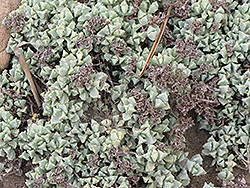Height: 12 inches
Spacing: 18 inches
Sunlight:
![]()
Hardiness Zone: (annual)
Other Names: syn. Oscularia deltoides, Ice Plant
Description:
Distinct, fleshy, triangular blue-green leaves held on violet stems; leaves are bordered by small red teeth and topped with daisy-like, lavender-pink flowers; this spreading evergreen requires sandy soil; a very unique addition to the garden
Ornamental Features
Pink Iceplant is blanketed in stunning lightly-scented pink daisy flowers at the ends of the stems from mid spring to mid summer. Its attractive succulent pointy leaves remain bluish-green in colour with hints of burgundy throughout the year. The violet stems are very colorful and add to the overall interest of the plant.
Landscape Attributes
Pink Iceplant is an herbaceous annual with a ground-hugging habit of growth. Its medium texture blends into the garden, but can always be balanced by a couple of finer or coarser plants for an effective composition.
This is a relatively low maintenance plant, and should never be pruned except to remove any dieback, as it tends not to take pruning well. Gardeners should be aware of the following characteristic(s) that may warrant special consideration;
- Spiny
Pink Iceplant is recommended for the following landscape applications;
- Mass Planting
- Rock/Alpine Gardens
- Groundcover
- Container Planting
Planting & Growing
Pink Iceplant will grow to be about 12 inches tall at maturity, with a spread of 24 inches. When grown in masses or used as a bedding plant, individual plants should be spaced approximately 18 inches apart. Its foliage tends to remain dense right to the ground, not requiring facer plants in front. Although it's not a true annual, this plant can be expected to behave as an annual in our climate if left outdoors over the winter, usually needing replacement the following year. As such, gardeners should take into consideration that it will perform differently than it would in its native habitat.
This plant should only be grown in full sunlight. It requires an extremely dry, well-drained growing location, and will usually die in standing water. It is considered to be drought-tolerant, and thus makes an ideal choice for a low-water garden or xeriscape application. It is not particular as to soil pH, but grows best in sandy soils. It is quite intolerant of urban pollution, therefore inner city or urban streetside plantings are best avoided. This species is not originally from North America. It can be propagated by cuttings.
Pink Iceplant is a fine choice for the garden, but it is also a good selection for planting in outdoor pots and containers. Because of its spreading habit of growth, it is ideally suited for use as a 'spiller' in the 'spiller-thriller-filler' container combination; plant it near the edges where it can spill gracefully over the pot. Note that when growing plants in outdoor containers and baskets, they may require more frequent waterings than they would in the yard or garden.
